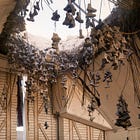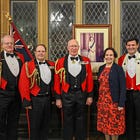Speech: Strong corruption watchdog vital for a peaceful democracy
Michelle Fahy, IPAN National Conference, 4-6 October 2024
In October, Michelle was invited to address the national conference of the Independent & Peaceful Australia Network (IPAN). The theme of the three-day conference, held in Perth, was Sleepwalking into War?
Michelle spoke about the importance of a strong and fearless National Anti Corruption Commission for a peaceful democracy.
Watch Michelle’s presentation (9 mins). Read the text of her speech below.

The conference included an interesting and packed program with all speeches available to watch from IPAN’s website.
Some of the other speakers included:
Former WA Premier, Carmen Lawrence AO on AUKUS
WA Senator Fatima Payman discussing what Australia’s policy response to Gaza should be
Former Australian ambassador to China, John Lander on the Australia-China-US dilemma
Dr Margie Beavis from the Medical Association for Prevention of War on naval nuclear reactor safety and security risks
Dorinda Cox, First Nations Greens Senator for WA, on AUKUS nuclear waste and First Nations perspectives
Adjunct Professor Al Palazzo from UNSW-Canberra, former Director of War Studies for the Australian Army, speaking on Alternative Defence and the new Australian Peace and Security Forum (APSF).
And many more.
Click here for all speeches and other elements of the program.
Text of Michelle’s speech
Delivery may not have exactly matched the text in parts. I have added links for readers who want to know more.
Hello everyone
I trust you are enjoying a thought-provoking and action-provoking conference. I’m disappointed I couldn’t be there in person to share it with you.
I would like to talk about Australia’s new National Anti-Corruption Commission, or the NACC, N-A-C-C, as it’s called.
Your first thought is probably, what does the NACC have to do with war or its prevention?
A strong, independent, and transparent anti-corruption commission is in fact an integral part of the apparatus that protects a peaceful democracy, exposes the misdeeds of those in power and holds them to account, and serves the national interest, and by that I mean the interests of the Australian people as a whole, and our ancient lands.
A robust anti-corruption commission is a critical foundation stone in achieving this.
Given the political promises and high hopes we all held, it is bitterly disappointing that what we have seen to date from the NACC falls very far short of the promises.
We were promised a transparent Commission with real teeth but the NACC’s first year has been marred by “secrecy and silence”, a criticism levelled by former judge and Chair of the Centre for Public Integrity, Anthony Whealy. He added that “you can’t deter corruption by remaining silent”.
The NACC’s first major decision, which took a year to deliver, was to decline to investigate the Robodebt referrals, the six public servants referred to it by the Robodebt Royal Commission for possible corrupt conduct.
The NACC outlined its reasons in a short statement which ended with a sentence saying it would provide no further comment.
This extraordinary statement - delivering a shock announcement and then refusing to make further comment - was criticised immediately by eminent barrister Geoffrey Watson, who said it reflected the exact opposite of what a transparent, accountable anti-corruption body should do and say.
As the still unfolding scandal of the NACC’s failure on the Robodebt referrals is making plain, the government’s promised Commission “with real teeth” appears not to have any teeth at all.
Anthony Whealy fears that we have a “timid” NACC. He described as “fatuous” the NACC’s reasoning for refusing to look at the Robodebt referrals.
Another former judge and long term integrity advocate, Stephen Charles, said that, “By refusing to act, NACC betrayed its core obligation and failed to fulfil its primary duty.”
Strong words.
Several people have asked me why I have taken and continue to take such an interest in the Robodebt referrals in my recent reporting. The NACC’s response to Robodebt appears to sit outside my usual remit of investigating the arms industry and its connections with the government. But it is actually closely related.
First is the abject failure of achieving any accountability from the architects of this unlawful scheme for the 500,000 plus of our fellow citizens affected by the Robodebt disaster.
Of additional importance is what this saga reveals about the way the NACC is going about its work.
If we have a “timid” NACC, as Whealy fears, there seems little hope it will take aim at the obvious corruption in the Australian arm of the global arms industry.
A strong NACC is vital for exposing arms industry corruption, given:
The massive amounts of public funding channelled into Defence – and now with AUKUS, it is insane how much money we are talking about
inbuilt drivers towards corruption, including the high value and complexity of arms deals, the close association between the industry and political power, and the secrecy surrounding arms deals under cover of ‘national security’
The lack of specific anti-bribery and corruption measures of international best practice standard in major defence procurements
The repetitive ‘revolving door’ of personnel between Defence, the military and the arms industry and their lobbyists.
And the numerous red flags for corruption in past arms procurement and sustainment contracts, two of which are known to have been referred to the NACC – the BAE Systems Frigate deal, and the Thales munitions factory deal. There could be more, we just don’t know.
I wrote about these concerns surrounding the legislation that set up the NACC back in October 2022 and have been watching it ever since.
The flawed premise on which it was set up means it will have difficulty exposing serious corruption in arms deals and other defence contracts. And Robodebt shows us that it may not even have the will.
Private (secret) hearings as the default are a big problem.
The legislation establishing the NACC dictated that a hearing ‘must’ be held in private unless the Commissioner decides to hold all or part of it in public.
Public hearings are only permitted if the Commissioner decides ‘exceptional circumstances’ justify it and it’s in the public interest. So far there have been none.
For arms trade investigations, public hearings particularly enable more effective investigations. Without public hearings, witnesses with key information may not realise an investigation is occurring or how their information fits into the case.
Federal Court Justice Brendan Murphy’s comments when approving the Robodebt class action settlement in June 2021 said: ‘The proceeding has exposed … a massive failure of public administration.’ The same could be said about our weapons acquisition deals – repetitively, over decades.
Second, the government may have picked the wrong man to run it, as both Stephen Charles and Geoffrey Watson have pointed out.
Speaking generally, Watson said a military background was the wrong ‘skill set’ for an integrity commission.
He acknowledged Brereton’s “fine legal background” yet added, “Military people love power. And how do you get power? You have control. And how to you get control? You’ve got secrecy. It’s exactly the opposite kind of skill set that you want for an organisation like this.” I agree.
My experience in reporting on Robodebt and engaging with the NACC in recent months is that you can now sense an ‘us and them’ mindset pervading the organisation in its handling of the public lashing over Robodebt. It has battened down the hatches and stopped answering questions from independent media. We are seeking accountability and transparency, but we have become the enemy.
The NACC’s Robodebt decision and subsequent behaviour therefore raises big questions for me about its willingness to conduct meaningful investigations into the Defence sector. I for one will be continuing to scrutinise its activity and performance.
I wish you all the best for the rest of your conference.





